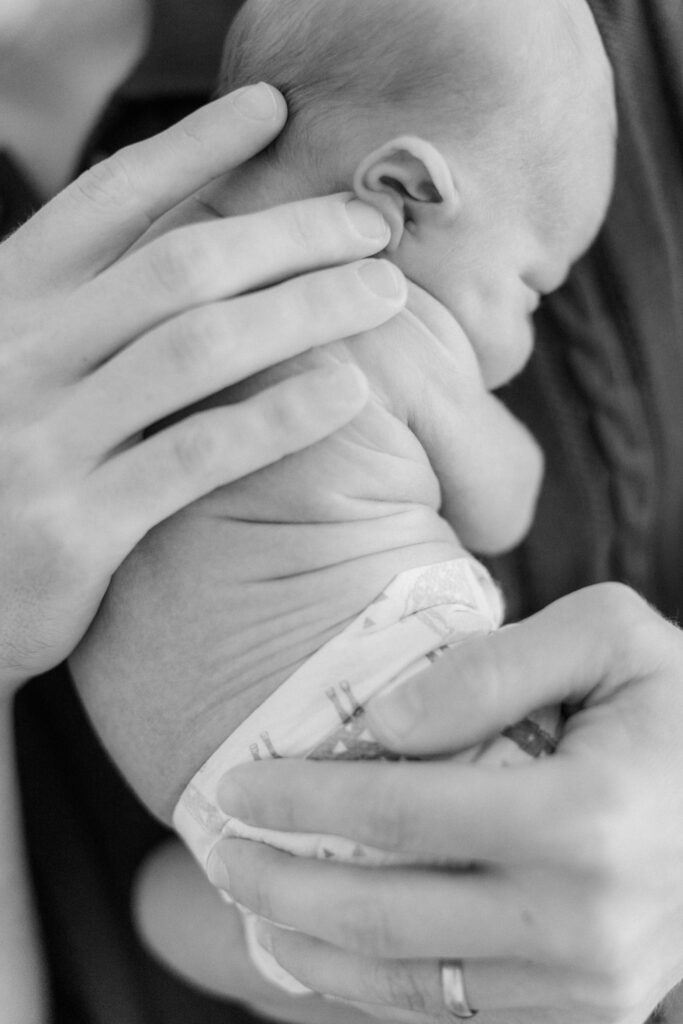The arrival of a newborn baby completely transforms your world, seemingly halting time in its tracks. However, as you return home, time swiftly resumes, bringing with it the challenges and questions that accompany early motherhood. I am eager to share some strategies to help you navigate through the that first beautifully chaotic week with your newborn baby.
As a luxury newborn photographer and a mom of three, I feel deeply connected to the journey of motherhood. While I certainly don’t claim to be an expert, I believe I have some valuable insights to offer new mothers as you navigate this time full of questions!



I hope you find these tips below helpful for surviving and ultimately, thriving, in your first week at home with your new little love!
Common Concerns:
During the first week after birth, your newborn is adapting to the outside world and may encounter issues like gas or fussiness. It is important not to panic as these are common occurrences. Gas and constipation are common concerns for newborns and may cause discomfort. Check out The Happiest Baby on the Block and “The 5 Ss,” a method of calming your baby (devised by pediatrician Dr. Harvey Karp). This method of soothing your baby includes five specific techniques to help your little one stop crying: Swaddle, Side/Stomach, Shush, Swing and Suck. Each of these techniques help mimic baby’s environment in the womb, which helps them feel calm and safe. Seek guidance from your healthcare provider if any concerns arise.
Bonding:
Take this time to bond with your baby. Crying and making other noises, smiling, searching for the breast, and seeking eye contact give cues for a caring adult to respond. Skin-to-skin contact, soothing touches, and talking to your baby can help strengthen your bond and help them feel secure. Bonding helps to make hormones and chemicals in the brain that help the baby’s brain to grow. Studies show consistent caregiver responses create trust and lifelong attachment in infants. This fosters healthy relationship skills and emotional development for the child to express emotions positively.
Feeding:
Whether you’re breastfeeding or formula-feeding, feeding your baby will take up a lot of your time. If your are nursing, prepare to feel ravenous. Make sure to stay hydrated and nourished, and don’t be afraid to ask for help if you’re struggling. Feeding your baby can be challenging, you are both trying to figure it out. Be patient and try different methods until you find what works best for you and your baby. Latching, choosing the right formula, knowing when and how often to feed can be hard to navigate. Patience is essential as both you and your baby adjust. Exploring different methods, seeking out advice and trying various schedules may be necessary before finding the most suitable routine. Be kind to yourself and seek support as needed.
Emotional Journey:
The journey of childbirth and the postpartum period can evoke a range of emotions due to hormonal shifts and the physical demands of motherhood. Be prepared that you won’t just feel “back to your old self”. It takes time and it’s normal for your hormones and emotions to feel like a bit of a rollercoaster. One minute you feel your heart may explode from love, then next you are sobbing because…because why? Who knows, sadness, anger, anxiety, you may just start crying. Let it all out when it comes. It can be a strange time as all your hormones regulate and change again. It is important to acknowledge that the emotions you experience are valid. Lean on your partner, family, and friends for support. Don’t hesitate to ask for help – it truly takes a village.
Rest and Self-Care:
It is crucial to remember that childbirth is a physically and emotionally demanding experience for your body. It is actually quite traumatic! Take care of yourself so you can take care of your little one. It is natural to feel discomfort and fatigue post-delivery. Allow yourself the necessary time to recover and heed the signals your body is sending. Taking care of yourself is vital to effectively caring for your new baby. Rest, listen to your body, and have essential items at hand to support your recovery. In the first week, sleep patterns are likely to be disrupted as you adapt to caring for your new baby. Setting realistic expectations and prioritizing rest whenever possible is important. Focus on establishing a routine that works for both you and your baby. Remember, it’s okay to say no to some social engagements – prioritize your well-being and ask for help!
The first week with a newborn is a time of adjustment and learning. Take care of yourself, seek support, and be patient during this time of change. You are not alone in this journey, and taking time to care for yourself will ultimately benefit both you and your new baby.
For more tips, check out these articles from Women’s Health Magazine and Parents Magazine.
Good luck on this new chapter, you’ve got this, mama!






Do you have more questions or want to chat about scheduling a photo session with your new baby? You may reach out to me directly here or learn more about my unique Luxury Photography Experience, my simple, yet luxurious process for busy mothers to get beautiful images with your family on your walls and in your hands! You may also be interested in my post about What to Wear at your family session or my FREE Guide for taking Better Photos of Your Kids!






+ COMMENTS
add a comment